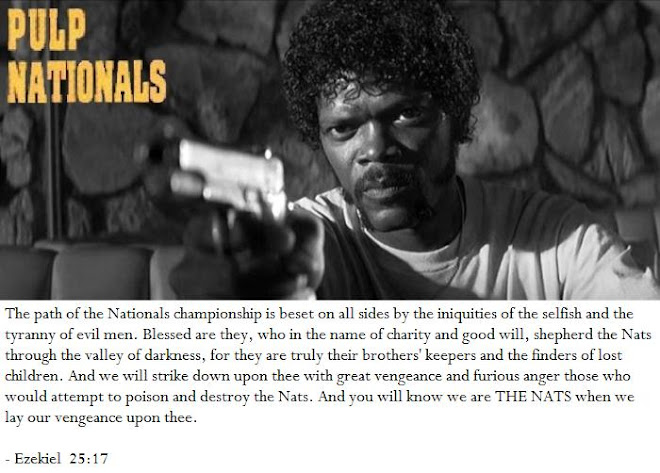
This morning, Josh Bard was interviewed on Baseball This Morning – an excellent radio show on XM channel 175.
The hosts wanted to ask Bard (who has been on successful teams like Boston, Cleveland and San Diego all when those franchises were winning ball games and contending for playoff spots) what it would take to turn the fortunes of the Nationals around.
One of the hosts, Buck Martinez (a former catcher and manager himself) pointed out that Bard offers the Nats some much needed leadership and a veteran presence in a crucial position on the field.
When asked about what the Nats could possibly do to take an abysmal season and draw any positives that could help the team going forward. He said that the team needs to forget about what’s happened to this point and start doing some of the little things right. It may not pay immediate dividends in terms of wins and losses, but the mentality of the club will change.
“We’ve got to get back to fundamentals,” Bard said. “When you have a young pitching staff like we have, you have to play good, solid, fundamentally sound defense and ensure that every time they make a good pitch an out will be made behind them.”
Very sound advice indeed. The way the Nats have been playing lately I wonder why anyone would want to pitch for them. Cristian Guzman looks like he regrets signing that extension and Ronnie Belliard appears to be moping around the dugout and looks dissatisfied with his diminished role. Julian Tavarez also looks like he finally woke up from that drunken stupor and realizes he did, in fact, go home with the fat chick from the bar.
Bottom line? We aren’t talking about professionals here. These are guys who would rather be elsewhere. Bard made reference to the attitude of a professional athlete.
“Playing good defense isn’t going to get you a big contract,” said Bard, “but it sure does help a team win ball games.”
One of the hosts then asked him about that philosophy: how does a ball player set aside personal financial gain in order to play for championships.
“I know no other way than to play to win,” said Bard. “When I was in San Diego, I learned from guys like Mike Cameron and Trevor Hoffman who taught me about all of the little things to show your teammates you care about the team. I mean Mike [Cameron] always gave up his body whenever he had the opportunity just to make an out and show his pitchers how much he wanted to help them win. Trevor taught me about playing hurt and giving of your body to help the team.”
So with that, I propose a serious overhaul and we need to dump Guzman as soon as anyone offers us more than a used jockstrap for him and Belliard needs to go as well. I believe both could be valuable elsewhere: Guzman doesn’t have the range for a long-term solution at SS, but if he can find a niche on a team in contention now, he’s certainly a good hitting SS and can help a team in need at that position; and if Belliard can ever learn to accept a backup role or if he can find a team in desperate need of a 2B full-time for a short period of time, he’s be useful to that team. But on a team with a 26-62 record, they appear to be collecting paychecks.
Julian Tavarez needs to go. He shouldn’t even be on a major league roster. I can’t believe someone out there would actually give up a wooden nickel for him so it’s time to cut ties and move on.
Go with Alberto Gonzalez and Anderson Hernandez at SS and 2B respectively and we’ll have solid defense up the middle with Nyjer Morgan in CF. Bard can be the infield leader behind the plate full-time (even if his defensive skills have diminished, he makes a great leader behind the plate and certainly has more pop in his bat than Wil Nieves). Live with Willingham and Dunn in the corner OF spots until you’re forced to trade Nick Johnson and then move on of them to 1B and call Elijah Dukes back up.
The Nats truly are at a crossroads. They are relying HEAVILY upon young, impressionable players and having guys around them like Guzman, Belliard and Tavarez who are aging veterans going through the motions teaches these kids the wrong way to play.
If the Nats want to break the culture of losing, it’s time to cut the losers before you turn all of these future Nats into losers.



.png)